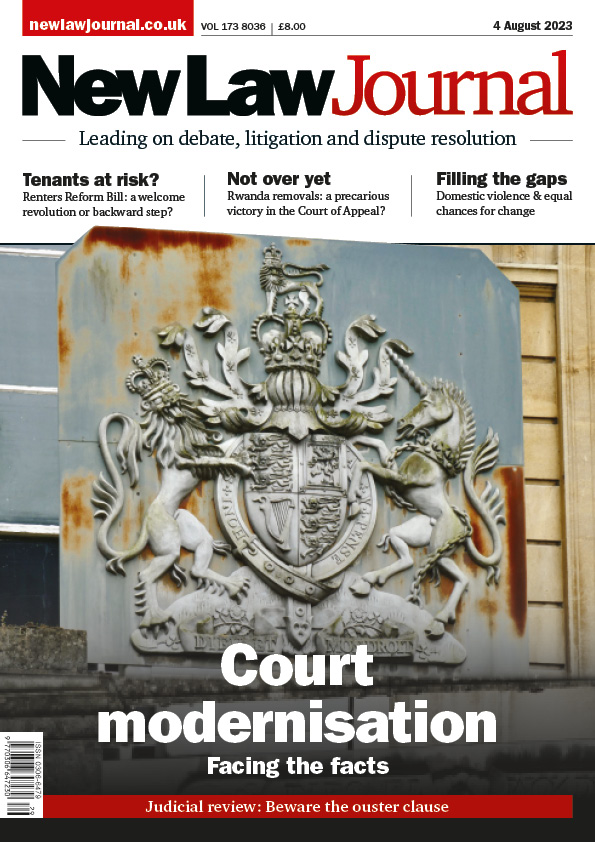THIS ISSUE

Stress needn’t be a constant in the lives of lawyers. The damage it can do is real, significant and, thankfully, can be reduced in many situations. In a must-read in this week’s NLJ, Hansa Pankhania, CEO of AUM Wellbeing Consultancy, offers tips and guidance on what to do when stress creeps up.
What are they really saying? NLJ columnist and former director of Justice, Roger Smith translates the ‘urbane language’ of the National Audit Office and Public Accounts Committee in this week’s issue, as he casts a critical eye on the progress of the courts & tribunals modernisation programme.
The Renters Reform Bill aims to change the nature of the landlord-tenant relationship, improving tenants’ security while giving greater flexibility to landlords. But can it achieve this? In this week’s NLJ, Gary Scott, partner at Spector, Constant & Williams, assess its chances.
While the Court of Appeal ruling that effectively halted the removal of ten asylum seekers to Rwanda in June was hailed as a victory by campaigners, the reality is less clear-cut, Dr Romit Bhandari writes in this week’s NLJ.
The government succeeded in blocking a potential judicial review, in a recent case on ouster clauses (Oceana). How concerned should we be about this development?
Will the courts & tribunals modernisation programme end up a victim of its own overambition? Roger Smith cuts through the government hype to find the facts
Intended to deliver a ‘renting revolution’, the Renters Reform Bill may ultimately achieve just the opposite: Gary Scott lists some causes for concern
Where is the line between the right to freedom of religion & the lawful expression of that right? Nicholas Dobson examines a complex question for the Employment Appeal Tribunal
In the first of a two-part series, David Burrows puts the case for pre-conditional order approval of financial settlements
The Court of Appeal’s decision on the Rwanda flights is less clear-cut than the outcome suggests, writes Dr Romit Bhandari
MOVERS & SHAKERS

Freeths—Rachel Crosier
Projects and rail practices strengthened by director hire in London

DWF—Stephen Hickling
Real estate team in Birmingham welcomes back returning partner

Ward Hadaway—44 appointments
Firm invests in national growth with 44 appointments across five offices
NEWS
The Police and Criminal Evidence Act 1984 transformed criminal justice. Writing in NLJ this week, Ed Cape of UWE and Matthew Hardcastle and Sandra Paul of Kingsley Napley trace its ‘seismic impact’
Operational resilience is no longer optional. Writing in NLJ this week, Emma Radmore and Michael Lewis of Womble Bond Dickinson explain how UK regulators expect firms to identify ‘important business services’ that could cause ‘intolerable levels of harm’ if disrupted
Criminal juries may be convicting—or acquitting—on a misunderstanding. Writing in NLJ this week Paul McKeown, Adrian Keane and Sally Stares of The City Law School and LSE report troubling survey findings on the meaning of ‘sure’
The Serious Fraud Office (SFO) has narrowly preserved a key weapon in its anti-corruption arsenal. In this week's NLJ, Jonathan Fisher KC of Red Lion Chambers examines Guralp Systems Ltd v SFO, in which the High Court ruled that a deferred prosecution agreement (DPA) remained in force despite the company’s failure to disgorge £2m by the stated deadline
As the drip-feed of Epstein disclosures fuels ‘collateral damage’, the rush to cry misconduct in public office may be premature. Writing in NLJ this week, David Locke of Hill Dickinson warns that the offence is no catch-all for political embarrassment. It demands a ‘grave departure’ from proper standards, an ‘abuse of the public’s trust’ and conduct ‘sufficiently serious to warrant criminal punishment’







